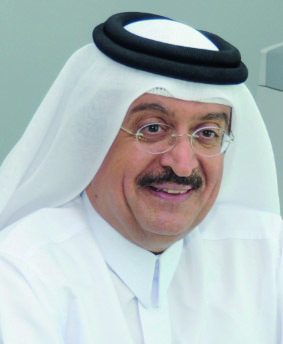
Professor Kyu Jung Chae
Doha: In cooperation between Qatar University (QU) and the Ministry of Municipality and Environment (MME), a joint research team worked on the scientific project aiming to address the main challenges represented by lack of cleaning, renewable energy globally and the continuous production of wastewater that the world faces and hinders human development.
The cooperation agreement between Qatar University and the MME came in 2018 to exchange information and experiences to establish joint cooperation in various fields related to the scientific, administrative and technical fields, cooperation in the field of research and studies.
The agreement also included conducting scientific research on sustainable biofuel production using solar energy and organic materials from “Sustainable Solar-Driven Biofuel Generation from Industrial Wastewater without External Bias”.

Dr Eng Muhammad Saif Al Kuwari
The scientific team consists of Professor Dr Siham Youssef Al Qaradawi, professor of organic chemistry at Qatar University; and Dr Engr Muhammad Saif Al Kuwari, Assistant Undersecretary, Director of the Studies Center Ministry of Municipalities and Environment; Professor Kyu Jung Chae, researcher and expert in studies related to the microbial electrolysis cell, Korea Maritime and Ocean University in Republic of Korea, in cooperation with the Public Works Authority (Ashghal), supervised and funded by the QNRF.
Prof Mariam Al Maadeed, Vice-President for Research and Graduate Studies at QU, said: “We are keen in the research and graduate studies sector at Qatar University to cooperate with government institutions and research agencies to join efforts and exploit the available resources and expertise between the two parties. From this standpoint, the agreement between the university and the Ministry of Municipal and Environment came to address the challenges on clean energy and the sustainability of its resources, biofuel production is a research achievement of this fruitful cooperation.”
Dr Siham Youssef Al Qaradawi
Dr Engr Muhammad Saif Al-Kuwari, Assistant Undersecretary, Director of the Center for Environmental and Municipal Studies at the Ministry of Municipality and Environment stressed the importance of this research project, saying: “Scientific research on sustainable biofuel production using solar energy and organic materials in wastewater and industrial will open up new and broad horizons for the exploitation of the country’s natural resources are the optimal use which is in line with Qatar’s 2030 vision, and investment in this field will be enhanced through the generation of sustainable biofuels and their use in transportation and industry, as biofuels are a renewable energy source that is produced by converting organic materials into biofuels, It can be used as fuel for various means of transportation and other industrial facilities.”
Dr Al Kuwari added: “This scientific project is an added value to convert wastewater into hydrogen, which is an effective alternative approach to biofuel production in Qatar and all over the world, due to its high energy and environmentally friendly combustion, as biofuels can reduce greenhouse gas emissions by about 1.7 billion tons per year, equivalent to more than 80 percent of current emissions from transportation and other things, thus leading to the introduction of a self-sustaining energy system for the production of bio-hydrogen with solar energy. Worldwide, large amounts of wastewater contain concentrations High inorganic, organic and microbiological pollutants, they are drained onto agricultural streams and inland lakes without reasonable treatment, causing harmful effects on public health and the environment.”
This research can be considered as a new platform for solar and biological energy fusion technology in Qatar, which includes innovative design and control of the chemical and physical properties of the compound electrode and membranes to provide outstanding performance towards green biofuel production and wastewater treatment.
The successful development of the PA-MEC-supported Microbial Electrophoresis Cell, based on highly efficient and low-cost electrodes, will open the way to adopting a new and innovative approach to the practical application of this type of fuel cell in Qatar, paving the way for the transfer of scientific and technical knowledge to exploit science.




